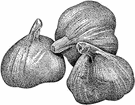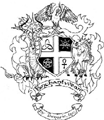
Garlic is a plant and an herb.
- botanical information
- history
- part used
- nutritional information
- storage
- magick correspondences and uses
- ritual uses
- Goddesses and deities
- essential oil
- health care
- Chinese herbology
- cautions and contraindications
botanical information:
Botanical name: Allium sativum
Common name: garlic
Use the botanical name when ordering seeds (bulbs, etc.) or when looking up information in the library. Common names vary by nation, culture, and region, and sometimes the same common name is applied to different plants.
history:
History: Garlic and onions were fed to 100,000 laborers (not slaves) who worked on the Great Pyramid of Khufu (Cheops).
Garlic was one of the ingredients mentioned in the Eber’s Papyrus. The Eber’s Papyrus (from between 1600 B.C.E. and 1550 B.C.E.), was discovered by German Egyptologist Georg Ebers in 1874 C.E. The Eber’s Papyrus is the oldest known complete medical textbook in existence. Most scholars believe that it is copy of a much earlier text, probably from around 3100 B.C.E. The Eber’s Papyrus includes information on surgery and internal medicine, including a list of more than 800 drugs.
Garlic was listed among many aromatic plants in a scroll of cuneiform from the great library at Nineveh. The library at Nineveh was established by King Ashurbanipal of Assyria (668-633 B.C.E.).
part used:
|
Part Used: Bulb. Information courtesy of Mountain Rose Herbs |
nutritional information:
Garlic is a source of copper.
Garlic is an herb that helps nourish the kidneys.
Garlic is a food that increases sexual energy and enhances fertility.
See also Chinese herbalism below for Chinese gender and Chinese flavor.
|
storage:
Storage: Garlic can safely be stored for more than a week.
magickal correspondences and uses:
Gender: masculine (traditional western European magickal gender)
Western element: fire
Magickal uses: Use for fire magick.
Magickal uses: protection
Magickal substitutions: Rosemary usually may be safely substituted for any herb in magick spells and rituals. Roses may safely be substituted for any flower.

Magical Uses information courtesy of 
|
ritual uses:
Ritual uses: Garlic was a common Kemetic (ancient Egyptian) offering. Garlic offerings were found in the tomb of Tutankhamun.
Ritual uses: Use for work with Hecate.
deities associated with garlic:
- Hecate (Greek Goddess)
- Mars (Roman God)
essential oil:
Safety Information: Garlic essential oil (Allium sativum) is hazardous and should not be used in aromatherapy, ingested, or come in contact with the skin.

health care uses:
Health Notice: Attempting to be an amateur doctor is potentially dangerous to your health. This web page is not professional medical advice. Nothing on this website should be considered as a substitute or replacement for professional medical advice. Persons should seek the advice of qualified health providers. Self-medication should not be used as a substitute for professional medical care. Please confirm all self-medication with your doctor or health care professional. See the article on healing for recommended healers.
traditional medicine:
Traditional Medicine: While many traditional practices have been scientifically verified, some are now known to be dangerous. Seek the advice of qualified health care providers.
Traditional medicinal uses: Garlic was one of the ingredients mentioned in the Eber’s Papyrus. The Eber’s Papyrus is the oldest known complete medical textbook in existence. Most scholars believe that it is copy of a much earlier text, probably from around 3100 B.C.E. Garlic was listed among many aromatic plants in a scroll of cuneiform from the great library at Nineveh. The library at Nineveh was established by King Ashurbanipal of Assyria (668-633 B.C.E.). Note that not all traditional medications are effective or even safe.
Chinese herbalism:
Chinese gender: strongly yang (hot)
Chinese flavor: pungent
herbal healing:
Garlic helps lower total cholesterol and triglyceride levels.
Garlic has antibacterial and antifungal properties.
Garlic may help prevent type 2 diabetes.
cautions and contraindications:
Some herbs may be poisonious under some conditions. Exercise appropriate care.
Essential oil warning: Garlic essential oil (Allium sativum) is hazardous and should not be used in aromatherapy, ingested, or come in contact with the skin.
Wild gathering: Avoid wild gathering. Some plants are endangered species. Some plants can be toxic just by touch. Even experts can make deadly misidentifications of wild plants. Please grow your own herbs in your own goddess garden (or window boxes).
Animal cautions and contraindications: Garlic should never be fed to cats or dogs.
See also: herbs













